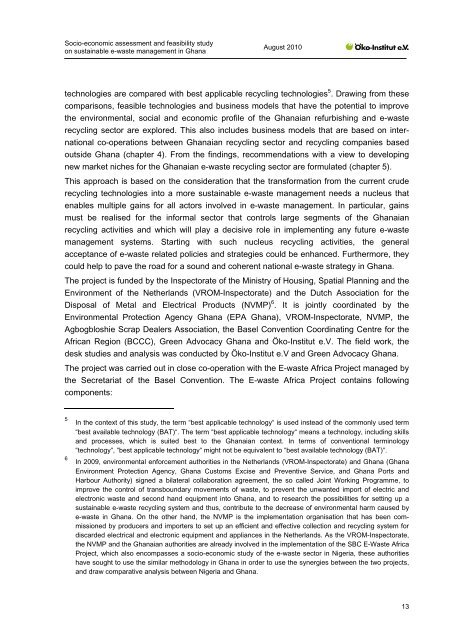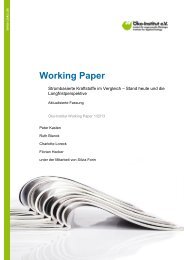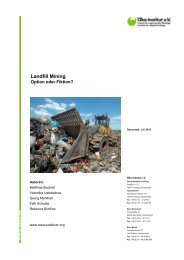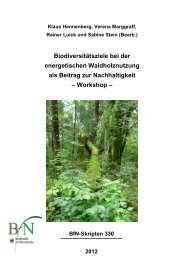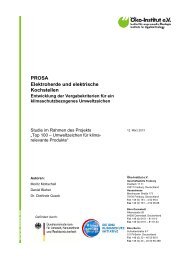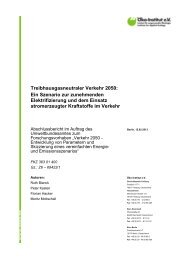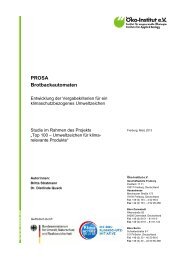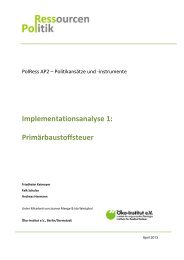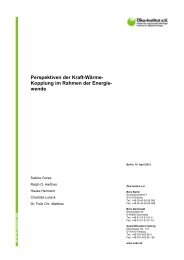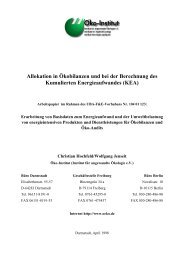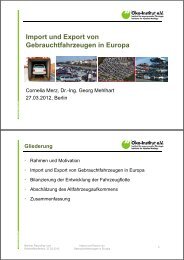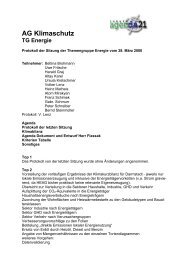Socio-economic assessment and feasibility study on - Öko-Institut eV
Socio-economic assessment and feasibility study on - Öko-Institut eV
Socio-economic assessment and feasibility study on - Öko-Institut eV
Create successful ePaper yourself
Turn your PDF publications into a flip-book with our unique Google optimized e-Paper software.
<str<strong>on</strong>g>Socio</str<strong>on</strong>g>-<str<strong>on</strong>g>ec<strong>on</strong>omic</str<strong>on</strong>g> <str<strong>on</strong>g>assessment</str<strong>on</strong>g> <str<strong>on</strong>g>and</str<strong>on</strong>g> <str<strong>on</strong>g>feasibility</str<strong>on</strong>g> <str<strong>on</strong>g>study</str<strong>on</strong>g><br />
<strong>on</strong> sustainable e-waste management in Ghana<br />
August 2010<br />
technologies are compared with best applicable recycling technologies 5 . Drawing from these<br />
comparis<strong>on</strong>s, feasible technologies <str<strong>on</strong>g>and</str<strong>on</strong>g> business models that have the potential to improve<br />
the envir<strong>on</strong>mental, social <str<strong>on</strong>g>and</str<strong>on</strong>g> <str<strong>on</strong>g>ec<strong>on</strong>omic</str<strong>on</strong>g> profile of the Ghanaian refurbishing <str<strong>on</strong>g>and</str<strong>on</strong>g> e-waste<br />
recycling sector are explored. This also includes business models that are based <strong>on</strong> internati<strong>on</strong>al<br />
co-operati<strong>on</strong>s between Ghanaian recycling sector <str<strong>on</strong>g>and</str<strong>on</strong>g> recycling companies based<br />
outside Ghana (chapter 4). From the findings, recommendati<strong>on</strong>s with a view to developing<br />
new market niches for the Ghanaian e-waste recycling sector are formulated (chapter 5).<br />
This approach is based <strong>on</strong> the c<strong>on</strong>siderati<strong>on</strong> that the transformati<strong>on</strong> from the current crude<br />
recycling technologies into a more sustainable e-waste management needs a nucleus that<br />
enables multiple gains for all actors involved in e-waste management. In particular, gains<br />
must be realised for the informal sector that c<strong>on</strong>trols large segments of the Ghanaian<br />
recycling activities <str<strong>on</strong>g>and</str<strong>on</strong>g> which will play a decisive role in implementing any future e-waste<br />
management systems. Starting with such nucleus recycling activities, the general<br />
acceptance of e-waste related policies <str<strong>on</strong>g>and</str<strong>on</strong>g> strategies could be enhanced. Furthermore, they<br />
could help to pave the road for a sound <str<strong>on</strong>g>and</str<strong>on</strong>g> coherent nati<strong>on</strong>al e-waste strategy in Ghana.<br />
The project is funded by the Inspectorate of the Ministry of Housing, Spatial Planning <str<strong>on</strong>g>and</str<strong>on</strong>g> the<br />
Envir<strong>on</strong>ment of the Netherl<str<strong>on</strong>g>and</str<strong>on</strong>g>s (VROM-Inspectorate) <str<strong>on</strong>g>and</str<strong>on</strong>g> the Dutch Associati<strong>on</strong> for the<br />
Disposal of Metal <str<strong>on</strong>g>and</str<strong>on</strong>g> Electrical Products (NVMP) 6 . It is jointly coordinated by the<br />
Envir<strong>on</strong>mental Protecti<strong>on</strong> Agency Ghana (EPA Ghana), VROM-Inspectorate, NVMP, the<br />
Agbogbloshie Scrap Dealers Associati<strong>on</strong>, the Basel C<strong>on</strong>venti<strong>on</strong> Coordinating Centre for the<br />
African Regi<strong>on</strong> (BCCC), Green Advocacy Ghana <str<strong>on</strong>g>and</str<strong>on</strong>g> Öko-<strong>Institut</strong> e.V. The field work, the<br />
desk studies <str<strong>on</strong>g>and</str<strong>on</strong>g> analysis was c<strong>on</strong>ducted by Öko-<strong>Institut</strong> e.V <str<strong>on</strong>g>and</str<strong>on</strong>g> Green Advocacy Ghana.<br />
The project was carried out in close co-operati<strong>on</strong> with the E-waste Africa Project managed by<br />
the Secretariat of the Basel C<strong>on</strong>venti<strong>on</strong>. The E-waste Africa Project c<strong>on</strong>tains following<br />
comp<strong>on</strong>ents:<br />
5 In the c<strong>on</strong>text of this <str<strong>on</strong>g>study</str<strong>on</strong>g>, the term “best applicable technology“ is used instead of the comm<strong>on</strong>ly used term<br />
“best available technology (BAT)“. The term “best applicable technology“ means a technology, including skills<br />
<str<strong>on</strong>g>and</str<strong>on</strong>g> processes, which is suited best to the Ghanaian c<strong>on</strong>text. In terms of c<strong>on</strong>venti<strong>on</strong>al terminology<br />
“technology“, “best applicable technology“ might not be equivalent to “best available technology (BAT)“.<br />
6 In 2009, envir<strong>on</strong>mental enforcement authorities in the Netherl<str<strong>on</strong>g>and</str<strong>on</strong>g>s (VROM-Inspectorate) <str<strong>on</strong>g>and</str<strong>on</strong>g> Ghana (Ghana<br />
Envir<strong>on</strong>ment Protecti<strong>on</strong> Agency, Ghana Customs Excise <str<strong>on</strong>g>and</str<strong>on</strong>g> Preventive Service, <str<strong>on</strong>g>and</str<strong>on</strong>g> Ghana Ports <str<strong>on</strong>g>and</str<strong>on</strong>g><br />
Harbour Authority) signed a bilateral collaborati<strong>on</strong> agreement, the so called Joint Working Programme, to<br />
improve the c<strong>on</strong>trol of transboundary movements of waste, to prevent the unwanted import of electric <str<strong>on</strong>g>and</str<strong>on</strong>g><br />
electr<strong>on</strong>ic waste <str<strong>on</strong>g>and</str<strong>on</strong>g> sec<strong>on</strong>d h<str<strong>on</strong>g>and</str<strong>on</strong>g> equipment into Ghana, <str<strong>on</strong>g>and</str<strong>on</strong>g> to research the possibilities for setting up a<br />
sustainable e-waste recycling system <str<strong>on</strong>g>and</str<strong>on</strong>g> thus, c<strong>on</strong>tribute to the decrease of envir<strong>on</strong>mental harm caused by<br />
e-waste in Ghana. On the other h<str<strong>on</strong>g>and</str<strong>on</strong>g>, the NVMP is the implementati<strong>on</strong> organisati<strong>on</strong> that has been commissi<strong>on</strong>ed<br />
by producers <str<strong>on</strong>g>and</str<strong>on</strong>g> importers to set up an efficient <str<strong>on</strong>g>and</str<strong>on</strong>g> effective collecti<strong>on</strong> <str<strong>on</strong>g>and</str<strong>on</strong>g> recycling system for<br />
discarded electrical <str<strong>on</strong>g>and</str<strong>on</strong>g> electr<strong>on</strong>ic equipment <str<strong>on</strong>g>and</str<strong>on</strong>g> appliances in the Netherl<str<strong>on</strong>g>and</str<strong>on</strong>g>s. As the VROM-Inspectorate,<br />
the NVMP <str<strong>on</strong>g>and</str<strong>on</strong>g> the Ghanaian authorities are already involved in the implementati<strong>on</strong> of the SBC E-Waste Africa<br />
Project, which also encompasses a socio-<str<strong>on</strong>g>ec<strong>on</strong>omic</str<strong>on</strong>g> <str<strong>on</strong>g>study</str<strong>on</strong>g> of the e-waste sector in Nigeria, these authorities<br />
have sought to use the similar methodology in Ghana in order to use the synergies between the two projects,<br />
<str<strong>on</strong>g>and</str<strong>on</strong>g> draw comparative analysis between Nigeria <str<strong>on</strong>g>and</str<strong>on</strong>g> Ghana.<br />
13


